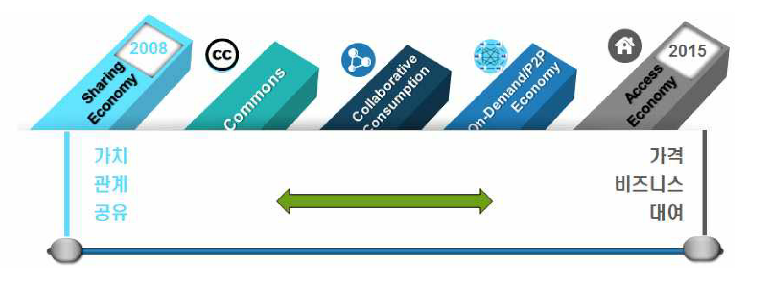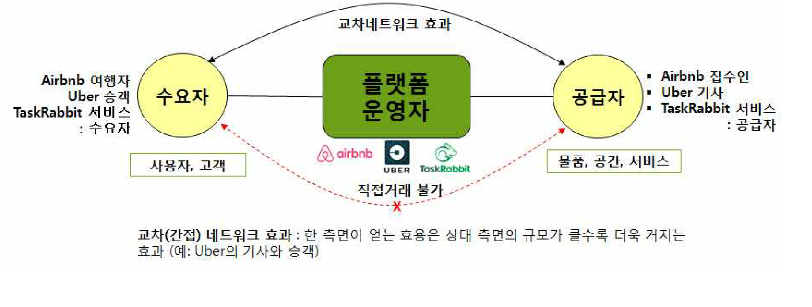List
Story > NEWS > Detail
[News] "Platform Business vs. Rental Business"
One of the most frequently asked questions about a shared economy is what's the difference between a shared economy and a rental service? This is not the case for services, but for goods, I think the question arises from a misunderstanding that the person who purchased the goods and had the goods was 'borrowing' them to others. Let's take this time to understand the difference between a platform business with a shared economy and a rental business.

First of all, the platform business is about connecting the consumer to the provider. From a business perspective, shared economies are being implemented in the form of P2P or On-Demand economies. These business models are closely related to platform services. The platform's strategy utilizes a two-sided market, which is divided between the suppliers who provide the goods or services and the consumers who use them. These two-sided business models are called platform businesses, and Uber and Airbnb are representative.
These platform business operators act as intermediaries between suppliers and consumers and generate revenue from fees. Thus, the platform business is highly scalable and is a model driven primarily by private companies. However, not only does the platform business have the potential to conflict with the existing market, it also needs know-how such as killer content and killer services that attract consumers and suppliers.

The previous example of a Uber is overseas, but in Korea, a 'everyone's parking lot' is shared. As you know, Uber was founded in 2009 under the name of Ubercab and has since 2010 provided a taxi-like transportation service to customers using an idle vehicle. Individuals use their own vehicles to provide transportation services, and the app allows users to quickly access the services by selecting the vehicles around them. In Korea, 'Everyone's Parking' is a service that connects owners (or operators) with drivers who need parking spaces. Using the application, owners of parking spaces share their parking spaces, earn profits, and drivers can use parking lots at an affordable price through a simple process. Of course, 'everyone's parking lot' makes a profit as a platform operator in the middle. Both Uber and 'Everyone's Parking' are examples of platform businesses.

So what does rental business mean?
Rental business is a cross-sectional market. This means that the provider of the shared goods and the service operator are the same. Of course, from a consumer's point of view, rental and sharing are similar in terms of borrowing and using goods instead of assetizing them. However, 'share' is the lending of surplus assets to others, and 'rental' is the initial lending to others and the buying and selling of assets in large quantities for the purpose of paying for them. Therefore, Rental will provide goods or services to users in the same organization as the provider.

Examples of the rental business are the rental car company Socar and the Seoul city bike Taeneungi. I don't know if there's a difference, but from the concept of rental rentals, both the Soca and the Thaengi are rental businesses.
It's not easy to clearly distinguish shared economy from rental service in the real world. However, there are two distinct business models. For platform businesses with shared economies, the provider may be an individual, but the service operator is a company. However, in a rental business, the provider's service operator becomes the same person. I'm going to finish by giving an example to the video rental store, the first store you can think of when you hear the word "rental." For platform businesses with shared economies, the videos you have in your home will be put on the platform and lent by others. But in the case of rental businesses, Hubv Video Shop, a provider and service operator, provides goods and services. This difference is not only the difference between the two sides and the other side, but also the social trust. It's because there's no choice but to create a difference in concept about whether you're looking at 'Entin' or 'Customer'.
In this time, we talked about the difference between platform business and rental business, which are shared economies. In this article, if you recognize that the shared economy is not just a rental business and want to start a business in the future, or improve your understanding of the shared economy, please proceed with caution.
The above article referred to the Gyeonggi Research Institute's report, "How to Support and Revitalize Business Organizations and Shared Companies."
One of the most frequently asked questions about a shared economy is what's the difference between a shared economy and a rental service? This is not the case for services, but for goods, I think the question arises from a misunderstanding that the person who purchased the goods and had the goods was 'borrowing' them to others. Let's take this time to understand the difference between a platform business with a shared economy and a rental business.

First of all, the platform business is about connecting the consumer to the provider. From a business perspective, shared economies are being implemented in the form of P2P or On-Demand economies. These business models are closely related to platform services. The platform's strategy utilizes a two-sided market, which is divided between the suppliers who provide the goods or services and the consumers who use them. These two-sided business models are called platform businesses, and Uber and Airbnb are representative.
These platform business operators act as intermediaries between suppliers and consumers and generate revenue from fees. Thus, the platform business is highly scalable and is a model driven primarily by private companies. However, not only does the platform business have the potential to conflict with the existing market, it also needs know-how such as killer content and killer services that attract consumers and suppliers.

The previous example of a Uber is overseas, but in Korea, a 'everyone's parking lot' is shared. As you know, Uber was founded in 2009 under the name of Ubercab and has since 2010 provided a taxi-like transportation service to customers using an idle vehicle. Individuals use their own vehicles to provide transportation services, and the app allows users to quickly access the services by selecting the vehicles around them. In Korea, 'Everyone's Parking' is a service that connects owners (or operators) with drivers who need parking spaces. Using the application, owners of parking spaces share their parking spaces, earn profits, and drivers can use parking lots at an affordable price through a simple process. Of course, 'everyone's parking lot' makes a profit as a platform operator in the middle. Both Uber and 'Everyone's Parking' are examples of platform businesses.

So what does rental business mean?
Rental business is a cross-sectional market. This means that the provider of the shared goods and the service operator are the same. Of course, from a consumer's point of view, rental and sharing are similar in terms of borrowing and using goods instead of assetizing them. However, 'share' is the lending of surplus assets to others, and 'rental' is the initial lending to others and the buying and selling of assets in large quantities for the purpose of paying for them. Therefore, Rental will provide goods or services to users in the same organization as the provider.

Examples of the rental business are the rental car company Socar and the Seoul city bike Taeneungi. I don't know if there's a difference, but from the concept of rental rentals, both the Soca and the Thaengi are rental businesses.
It's not easy to clearly distinguish shared economy from rental service in the real world. However, there are two distinct business models. For platform businesses with shared economies, the provider may be an individual, but the service operator is a company. However, in a rental business, the provider's service operator becomes the same person. I'm going to finish by giving an example to the video rental store, the first store you can think of when you hear the word "rental." For platform businesses with shared economies, the videos you have in your home will be put on the platform and lent by others. But in the case of rental businesses, Hubv Video Shop, a provider and service operator, provides goods and services. This difference is not only the difference between the two sides and the other side, but also the social trust. It's because there's no choice but to create a difference in concept about whether you're looking at 'Entin' or 'Customer'.
In this time, we talked about the difference between platform business and rental business, which are shared economies. In this article, if you recognize that the shared economy is not just a rental business and want to start a business in the future, or improve your understanding of the shared economy, please proceed with caution.
The above article referred to the Gyeonggi Research Institute's report, "How to Support and Revitalize Business Organizations and Shared Companies."



